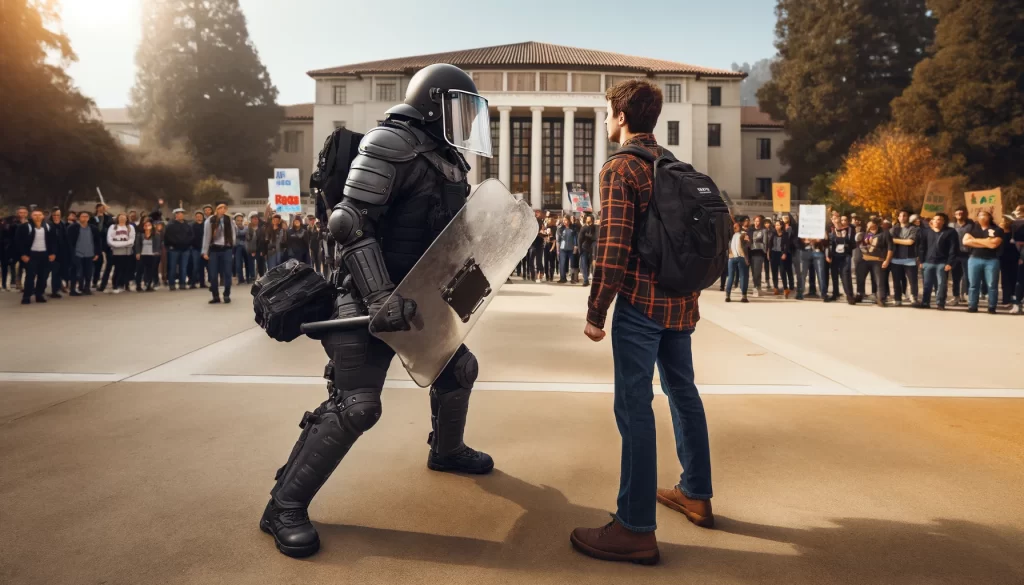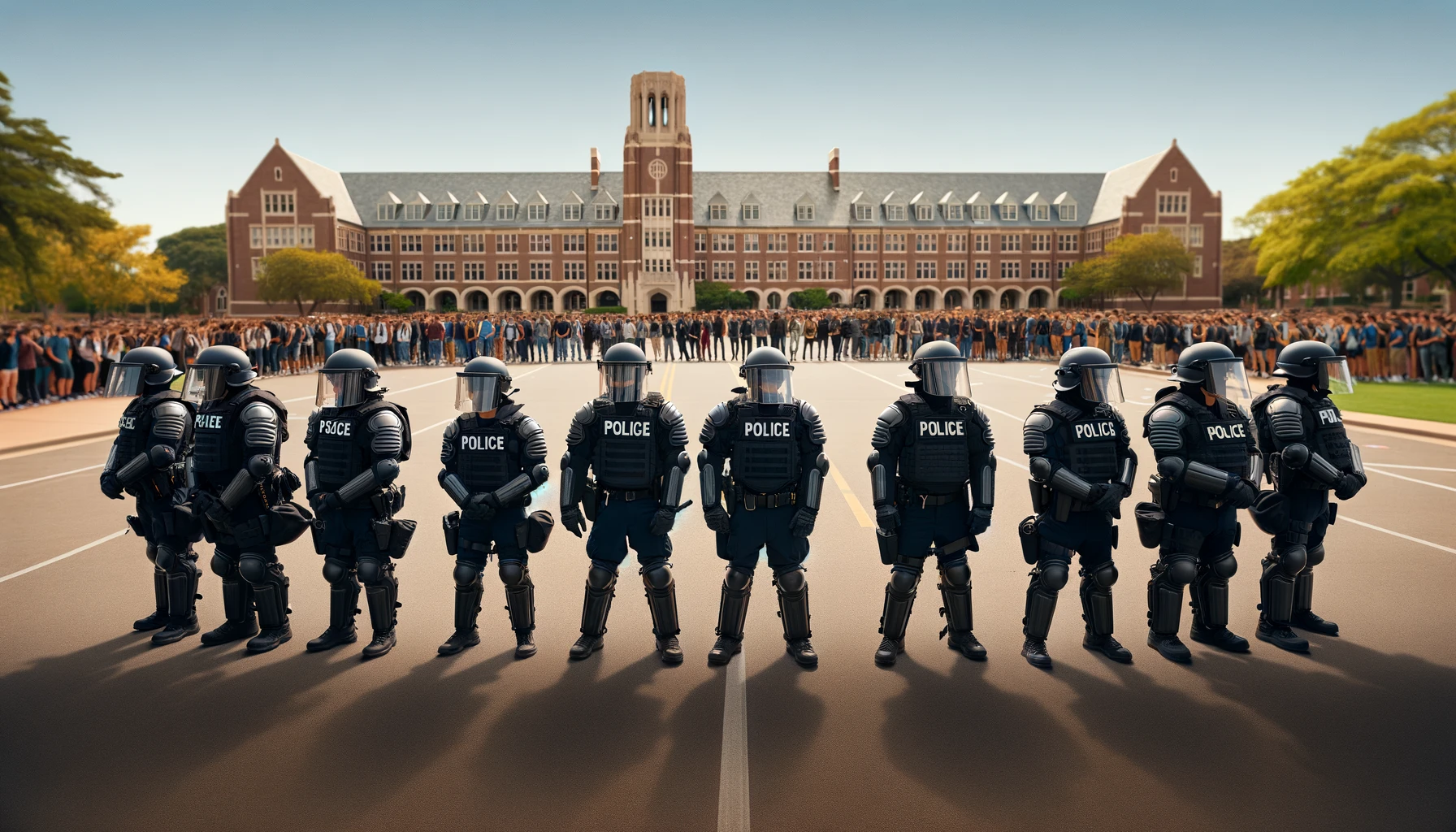In recent months, university leaders have grappled with effectively communicating their free speech policies during the ongoing Israel-Hamas conflict. This dilemma has escalated to the point where law enforcement in riot gear has been deployed to handle the situation, reflecting the severity of the campus unrest.
The Core Issue
Initially, universities permitted protests related to the conflict, trying to maintain a balance between free expression and campus safety. However, this dual approach—supporting free speech while later involving police to disperse protests—has not been well-received, alienating various campus groups.
Response Challenges
Since the conflict began, university officials have been cautious in their responses, wary of upsetting students, faculty, donors, and alumni. This cautiousness stemmed from a complex backdrop of global political tensions, making any public statements highly sensitive.
The ambiguity in university responses reached a critical point when several university presidents were called before Congress to clarify whether extreme statements made during protests, like those calling for the genocide of Jews, violated their institutions’ conduct codes. The unclear answers provided led to significant repercussions, including job losses for some administrators.
Communication Breakdown
Communication experts have pointed out that the intricate and contentious nature of the Israeli-Palestinian conflict makes it a particularly challenging topic for clear and effective campus communication. The failure to establish straightforward communication and safety protocols has exacerbated tensions, leading to a boiling point of campus unrest.

A higher education communications consultant emphasized the importance of avoiding police confrontations on campus, advocating for sustained and constructive communication as the key to long-term peace and understanding.
Efforts to De-escalate
Some universities have seen success in de-escalating tensions. Brown University, for example, managed to disperse a protest encampment by agreeing to future discussions with protestors. Similarly, Northwestern University reached an agreement with its student protesters, showcasing a move towards dialogue over confrontation.
Arrests and Class Disruptions
Despite these successes, the broader picture remains grim, with over 1,300 arrests made at 40 college campuses nationwide, according to Axios. The ongoing disturbances have also forced some colleges to cancel in-person classes or switch to virtual formats, and at least one university has canceled its upcoming graduation ceremony due to security concerns.
Social Media’s Role
The protests have gained significant attention, partly due to the viral nature of social media. One communications adviser remarked on the ease of attracting mainstream attention today, where a single cellphone video can amplify a cause to the same extent as traditional media outlets.
High-Profile Commencement Addresses
The situation is expected to garner further attention during upcoming high-profile commencement addresses. With speakers like President Biden at Morehouse College, Jerry Seinfeld at Duke University, and Melinda Gates at Stanford, university administrators are bracing for potential disruptions, dedicating unprecedented time to planning and security discussions.
This article is based on the following article:
https://www.axios.com/2024/05/02/israel-pro-palestinian-protests-college-campus-universities

Background Information
By understanding these elements, readers can better appreciate the complexities involved in managing free speech and safety on college campuses, as well as the broader societal and political issues that influence campus dynamics
1. Understanding Free Speech on College Campuses
Free Speech: In the United States, free speech is a fundamental right protected by the First Amendment to the Constitution. It allows individuals to express themselves without interference or constraint by the government. On college campuses, this right enables students and faculty to engage in discussions, debates, and protests about various topics.
University Policies: Universities often have specific policies that outline what is considered acceptable speech and behavior on campus. These policies aim to balance the right to free speech with the need to maintain a safe and inclusive environment for all students.
2. The Role of Campus Protests
Campus Protests: Protests are a common way for college students to express their opinions and advocate for changes. They can be prompted by global issues, campus policies, or social injustices. While protests are generally protected by free speech rights, they can sometimes lead to tensions or conflicts if they disrupt educational activities or lead to safety concerns.
3. The Israel-Hamas Conflict
Background: The conflict between Israel and Hamas is part of the larger Israeli-Palestinian conflict. Israel is a country in the Middle East, established in 1948, which has been in conflict with Palestinian groups, including Hamas. Hamas is a Palestinian Islamist political organization and militant group that has controlled the Gaza Strip since 2007. The conflict has been marked by violence, political disagreements, and complex international relations.
Impact on Global Opinion: The Israel-Hamas conflict often sparks strong opinions and protests around the world, including on college campuses. People may take sides based on political, religious, or humanitarian views, leading to heated debates and demonstrations.
4. Media and Communication
Role of Social Media: In today’s digital age, social media plays a crucial role in how information is shared and how movements are organized. A single post can go viral and reach millions of people, which can significantly amplify the impact of a protest or a political stance.
5. Security Measures on Campus
Law Enforcement: Universities sometimes involve law enforcement to ensure safety during protests, especially if there’s a risk of violence or disruption. This can include local police or campus security. The presence of law enforcement in riot gear at protests can be controversial and is often seen as an escalation of force.
Event Planning and Security: High-profile events like commencement ceremonies, which often feature notable speakers, require extensive planning and security measures to ensure they proceed smoothly without disruptions from protests or other security risks.
Please subscribe to Insight Fortnight, our biweekly newsletter!
